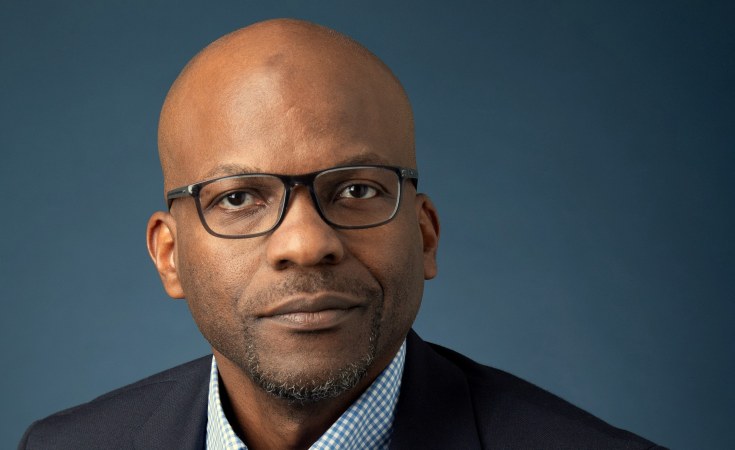Washington, DC — When President Joe Biden, addressing the U.S.-Africa Leaders Summit in December, thanked major American corporations like Microsoft, General Electric and Visa for announcing some $15 billion in new deals, he included mention of "a diaspora-owned small business" called Cybastion that jointly with Cisco had signed contracts "to protect African countries from cyber threats."
Headquartered in North Carolina, Cybastion was launched in 2019 with initial projects in Burkina Faso and Benin followed by engagements in Central African Republic, Cote d'Ivoire, Niger and Namibia. The company's collaboration with Cisco includes cybersecurity export agreements with Niger, Côte d'Ivoire, Burkina Faso, Congo Brazzaville, Benin, and Cameroon totaling $858 million, the company announced.
The president and CEO of Cybastion, Dr. Thierry Wandji, has 15 years of experience in academic research and teaching in the defense and intelligence fields, including more than a decade working at the U.S. Navy Air Systems Command, most recently as technical lead for design and implementation of critical cybersecurity and intelligence solutions. Alongside colleagues with complementary skills, he said he wanted to "leverage the expertise" they had accumulated to help Africa "get up to speed quickly."
He assembled an experienced executive team that includes Senior Vice President for Operations Andre Biyong, Chief Technical Officer Kevin Cardwell, Senior Vice President for Business Strategy and Government Affairs Leila Ndiaye, and Gildas Houessinon, who heads the Cybastion Institute of Technology. "Africa must embrace the digital revolution," he said in an interview, "and cyber-safety has to be a central part of the strategic development plan."
"African organizations are not giving cybersecurity the priority it deserves, and this inadequate security is directly affecting business for enterprises, as well as countries," cybersecurity expert Shane McCarthy wrote in an article for the World Economic Forum in August, calling cybersecurity "key to participating in global markets." Africa loses an estimated $4 billion annually to cybercrime, according to an IDC report cited in a Tech Cabal article examining cyber threats faced by Africa's e-commerce and payment sectors.
Born in Cameroon, Wandji left home at age 17 to attend secondary school in Canada. After graduation, he received a scholarship at the Polytechnic School of Engineering in Montreal where he earned a degree in Electrical Engineering. He followed that with a Master's Degree in electrical engineering from Morgan State University in Baltimore and another Master's in cybersecurity from the University of Maryland. After joining the Navy as systems engineer, he earned a PhD at George Washington University, writing his doctoral dissertation on software reliability and security.
Cybersecurity is central as Africa embraces the digital revolution.
Cybastion focuses on people, process and technology. "We make sure we connect these for greater outcome," Wandji said. For training employees, the company works with partners like Cisco and Microsoft.
"With the exponential progression of data on the [African] continent, we don't have nearly enough engineers - and that can lead to chaos," he said. Cybastion is working with governments not only on education programs to fill this gap but also on the incentives needed to retain skilled personnel who might be recruited for higher paying positions abroad.

Wandji believes advanced security protections are often overlooked in the rush to adopt new technologies, opening the way for ransomware and other data breaches. "There is a huge need to help government officials and lawmakers understand what policies are needed," he said. To develop the framework for national approaches to cyber safety, "you need to build a roadmap".
Cybastion has worked with four countries to create their national cybersecurity agencies: Benin, Burkina Faso, Niger and Cote d'Ivoire. Wandji said the goal is "to use the same playbook" in every country, drawing in expertise from other regions, including the United States. By putting viable protections in place, African nations are creating new opportunities for economic growth and much-needed employment for young people.
He said the work on cybersecurity leads directly into the e-government initiatives that every country is undertaking. A reliable eco-system is essential. As governments digitize sensitive documents like birth certificates and passports, concern for privacy and "data sovereignty" becomes a high priority, he said, which means the capacity for secure in-country data storage rather than reliance on outside cloud providers. Governments realize they lack such capacity and partner with companies like Cybastion to safeguard their data centers.
Cybercrime is borderless; cross-border collaboration is key.
At the same time, cross-border collaboration is essential. Cybastion is supporting a regional approach across west Africa, working with countries to share threat data and establish a level of security that protects all. "Governments understand the need for interoperability cooperation," Wandji said.
Because cybercrime is borderless, a country with decent security can experience serious problems if a neighbor is hacked. And these breaches come with a price tag. "We are confident that with the experience our team has, we can have a significant impact, not just for governments but for the populations where we are working," he adds.
U.S. pledge of assistance can boost data protection initiatives.
One important outcome from the U.S.-Africa Leaders Summit in Washington that Wandji cites is the U.S. commitment to finance that cross-country cooperation. During the Summit, the White House pledged to invest $350 million and facilitate another $450 million in financing for the Digital Transformation with Africa (DTA) Initiative. Included in the new program is capacity building and technical assistance from the State Department for cybersecurity and an interagency effort led by the U.S. Trade and Development Agency (USTDA) "to advance inclusive, secure, and sustainable digital infrastructure."
African governments are committing their own funding "because they recognize the urgency," and those investments should enable digital programs to get underway even before U.S assistance arrives, Wandji said. He expects Cybastion to extend its engagement to more countries in west Africa this year, such as Guinea (Conakry), Ghana, Sierra Leone and Liberia.


